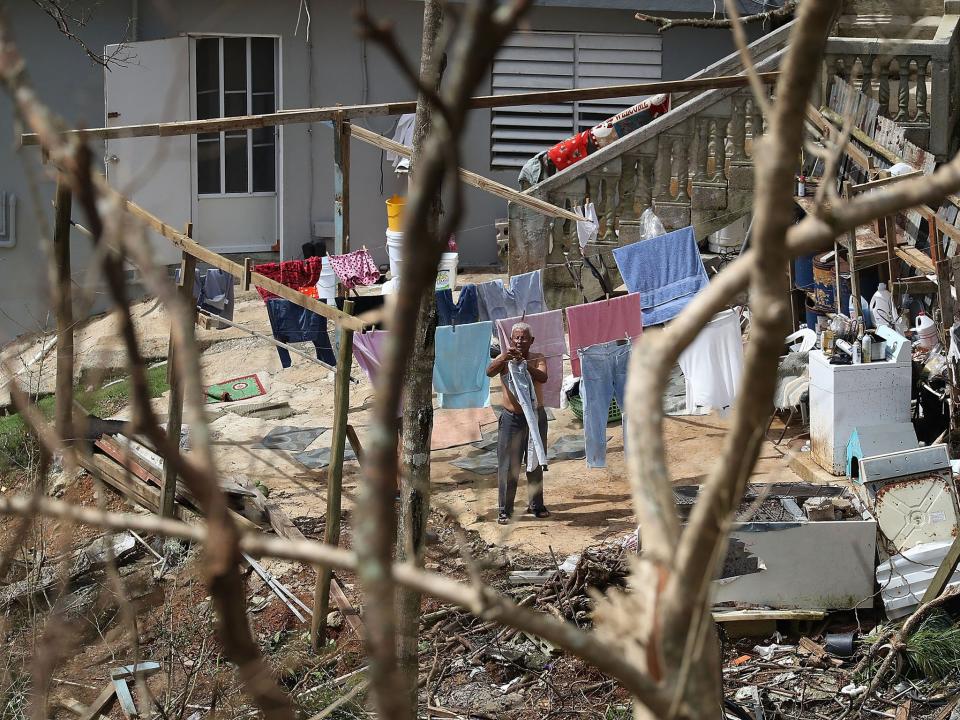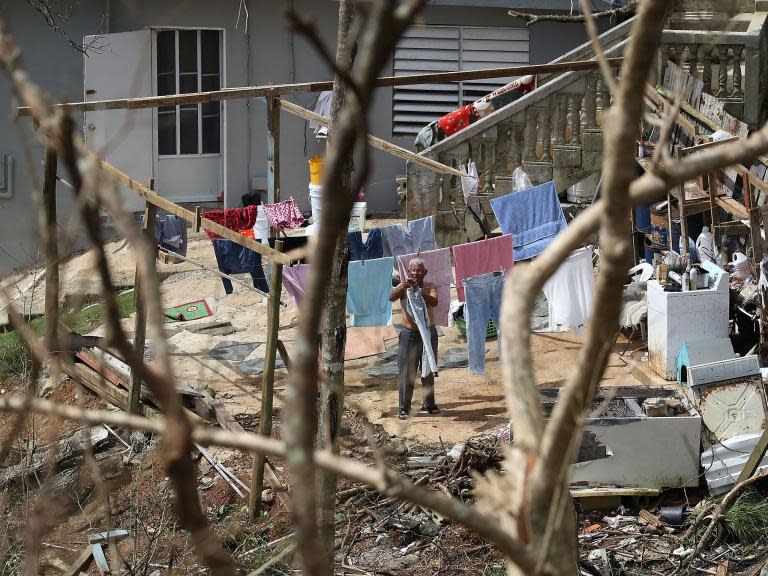Trump 'doesn't want another single dollar' going to Puerto Rico, White House official says
Donald Trump reportedly "doesn't want another single dollar" of additional relief funds going to Puerto Rico, which is still struggling amid the fallout from Hurricane Maria in 2017.
In a meeting with advisers in the Oval Office last month, the US president asked for ways to limit government financial support from going to the Caribbean island, according to The Washington post, who cited senior administration sources.
Mr Trump allegedly wanted more money going to the mainland, and that he only wanted to allocate funds that would fortify Puerto Rico's electric grid.
According to the newspaper, the billionaire has also privately signalled he will not approve any additional help to the island beyond food stamp money, which was drastically cut after Congress failed to vote for its reauthorisation earlier this month.
A senior administration official told the newspaper: "He doesn't want another single dollar going to the island."
[[gallery-0]]
It comes amid a battle over a long-delayed disaster aid bill that has become a top political priority for some of Mr Trump's Republican allies as it heads to the Senate floor this week.
At stake is $13.5bn (£10.2bn) emergency relief legislation to help southern farmers, rebuild hurricane-damaged military bases, repair water systems, and assist victims of last year's California wildfires, among other purposes.
The measure has wide backing from both Democrats and Republicans and is perhaps most ardently backed by Trump loyalists such as senators David Perdue and Thom Tillis, who face potentially difficult re-election fights next year.
The White House, however, is unhappy with the bill and remains opposed to efforts by Democrats to make hurricane relief to Puerto Rico more generous.
Senate Republicans are supporting food aid to the devastated island and are working with top Democrats like Patrick Leahy of Vermont to try to speed passage of the measure by adding additional help for Puerto Rico.
The House passed a companion $14.2bn (£10.7bn) version of the legislation in January, but it got tangled up in the politics of the partial government shutdown and Mr Trump's demands for a wall along the US-Mexico border.
The measure is especially sought by lawmakers from southern states like Florida, Georgia and North Carolina, which were hit by hurricanes Michael and Florence last year.
There is also money to respond to floods in South Carolina, Nebraska, Iowa and other Midwestern states, an earthquake in Alaska, California wildfires, as well as Puerto Rico.
In an official position paper in January, the White House said the House bill was far too generous, objecting to almost $6bn (£4.6bn) worth of the measure. But it stopped short of an outright veto threat, and aides say Mr Trump has since told Mr Perdue he would sign the Senate version of the bill, which mirrors the House plan in most respects.
For many lawmakers, passage is already overdue. Puerto Rico has already cut nutrition benefits by roughly 25 per cent amid the funding crunch and Georgia lawmakers warn that their farmers need help in the run-up to planting season.
"We are past the time when this should have gotten done. I have spoken with the president many times about this. His commitment to our farmers is unwavering," Mr Perdue said last month.
Mr Trump's commitment to aid to storm-ravaged Puerto Rico is in question, however.
Last fall, Mr Trump tweeted falsely that the government of Puerto Rico was using disaster aid funding to pay off its debt, and earlier this year Mr Trump reportedly contemplated trying to shift some of Puerto Rico's disaster aid to address disaster in the mainland US.
While Mr Trump supports $600m (£454m) to maintain food stamp benefits in Puerto Rico, Capitol Hill aides say the White House is opposing more generous terms for delivery of disaster aid dollars and funding to rebuild antiquated water systems and make them more resilient to future storms.
Allies of Puerto Rico say Mr Trump treats the US territory worse than states that have endured far less devastating hurricane disasters.
"These folks are living under the American flag," said Democratic congressman Jose Serrano. "They should not be treated any differently than any other American citizen."
The Puerto Rican vote is an increasingly potent vote in Florida, an essential state to Mr Trump's re-election bid. Florida senator Rick Scott, a Trump ally, is a strong supporter of aid to the island.
"Puerto Rico's success is America's success and Puerto Rico's recovery is America's recovery," Mr Scott said in his maiden Senate speech earlier this year.
The measure represents leftover business from last year, but efforts to add it to a catchall spending bill fizzled last month. Advancing the measure on its own promises to be a delicate task and a test of divided government. It reconnects the main players in last month's successful negotiations on a catchall spending bill and border security measure.
That success has lawmakers and staff aides cautiously confident that talks between Senate appropriations committee Chairman Richard Shelby and top panel Democrat Patrick Leahy of Vermont will bear fruit and that the measure could pass the chamber by the end of the week.
If the legislative planets aligned just right, supporters hope, the Democratic-controlled House could simply pass the Senate bill and immediately ship it to Mr Trump, forgoing any need for time-consuming House-Senate conference talks.
Generally, the more disaster areas that are addressed in an emergency aid bill, the easier it is to pass. That seems to be true in this case, and the legislation could be helped as well because so many Trump-friendly areas were affected.
Tyndall Air Force Base on Florida's Panhandle took a direct hit from Hurricane Michael last October and Camp Lejeune in North Carolina took a big hit from Hurricane Florence. Communities in wildfire-ravaged northern California are eager for rebuilding help and thousands of homes in Alaska were damaged in last year's earthquake.
Additional reporting by AP

 Yahoo News
Yahoo News 

